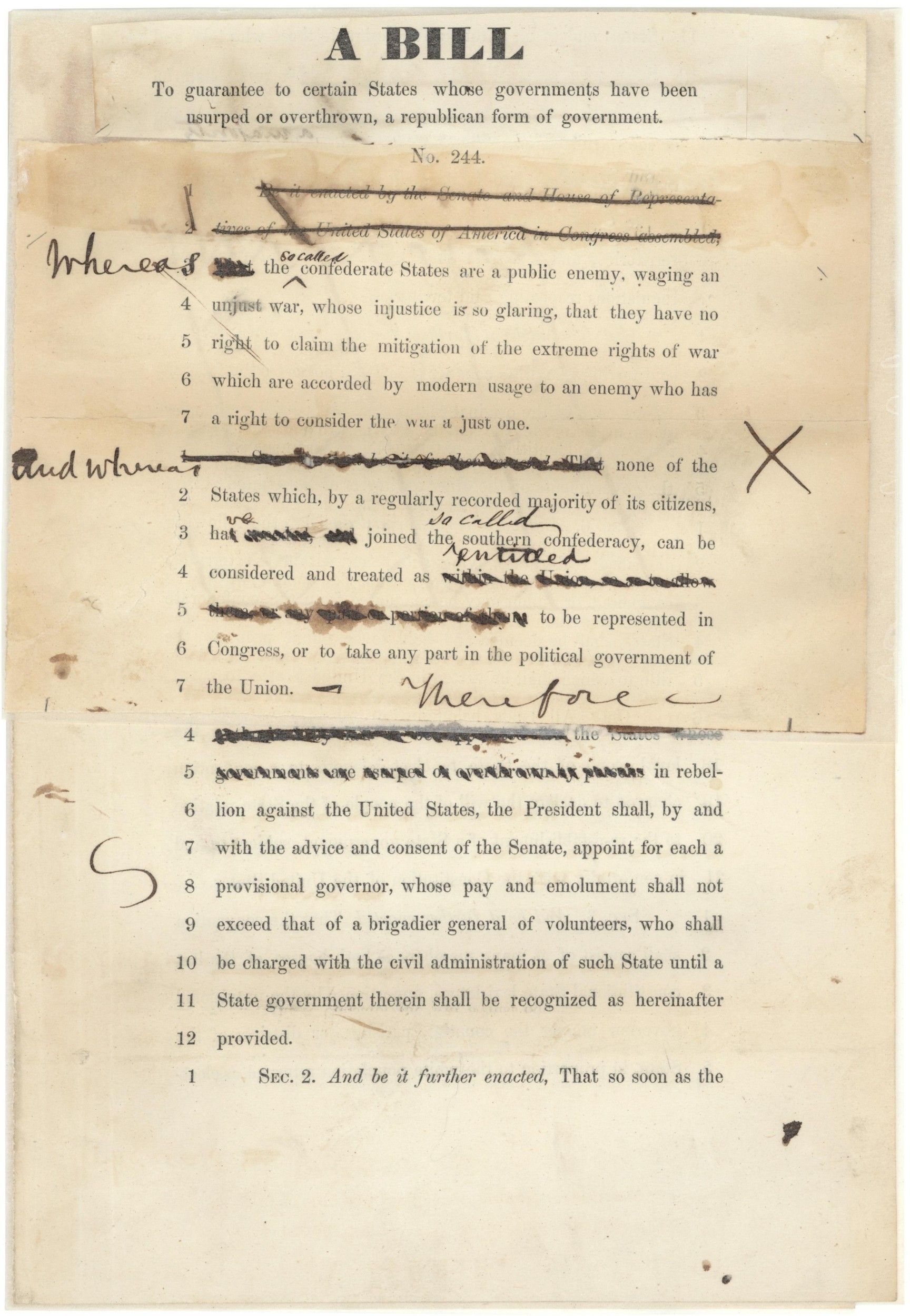Reconstruction and the Ku Klux Klan
Making Connections
All documents and text associated with this activity are printed below, followed by a worksheet for student responses.Introduction
Examine the following Reconstruction-era documents. Determine from their details how the everyday lives of freed slaves changed after the Civil War. Consider how these events or actions might have influenced the formation and rise of hate groups such as the Ku Klux Klan during and following the Reconstruction Era. Be sure to click on the "Details" button for each document for more information.Name:
Class:
Class:
Worksheet
Reconstruction and the Ku Klux Klan
Making Connections
Examine the documents and text included in this activity. Fill in any blanks in the sequence with your thoughts and write your conclusion response in the space provided.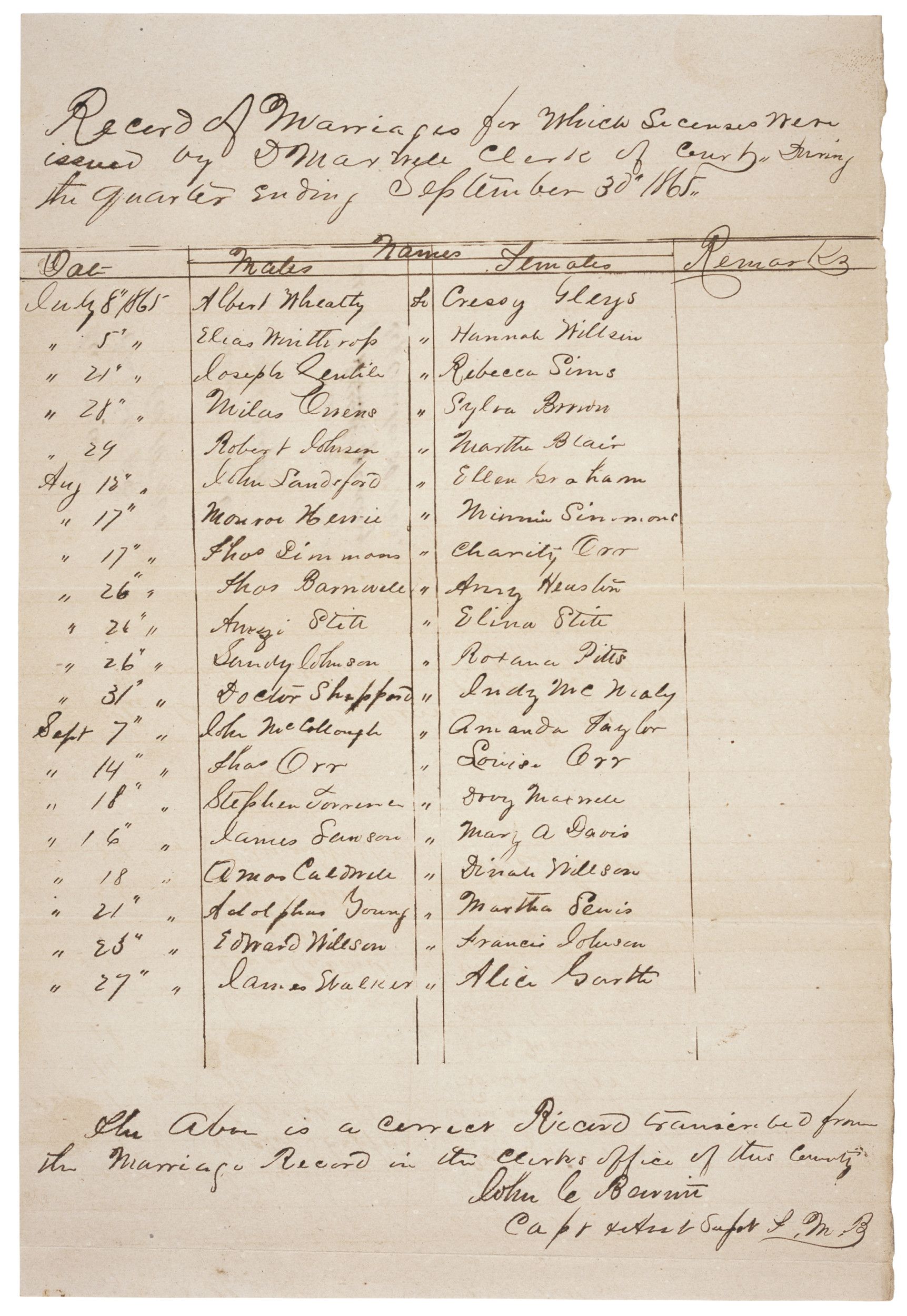


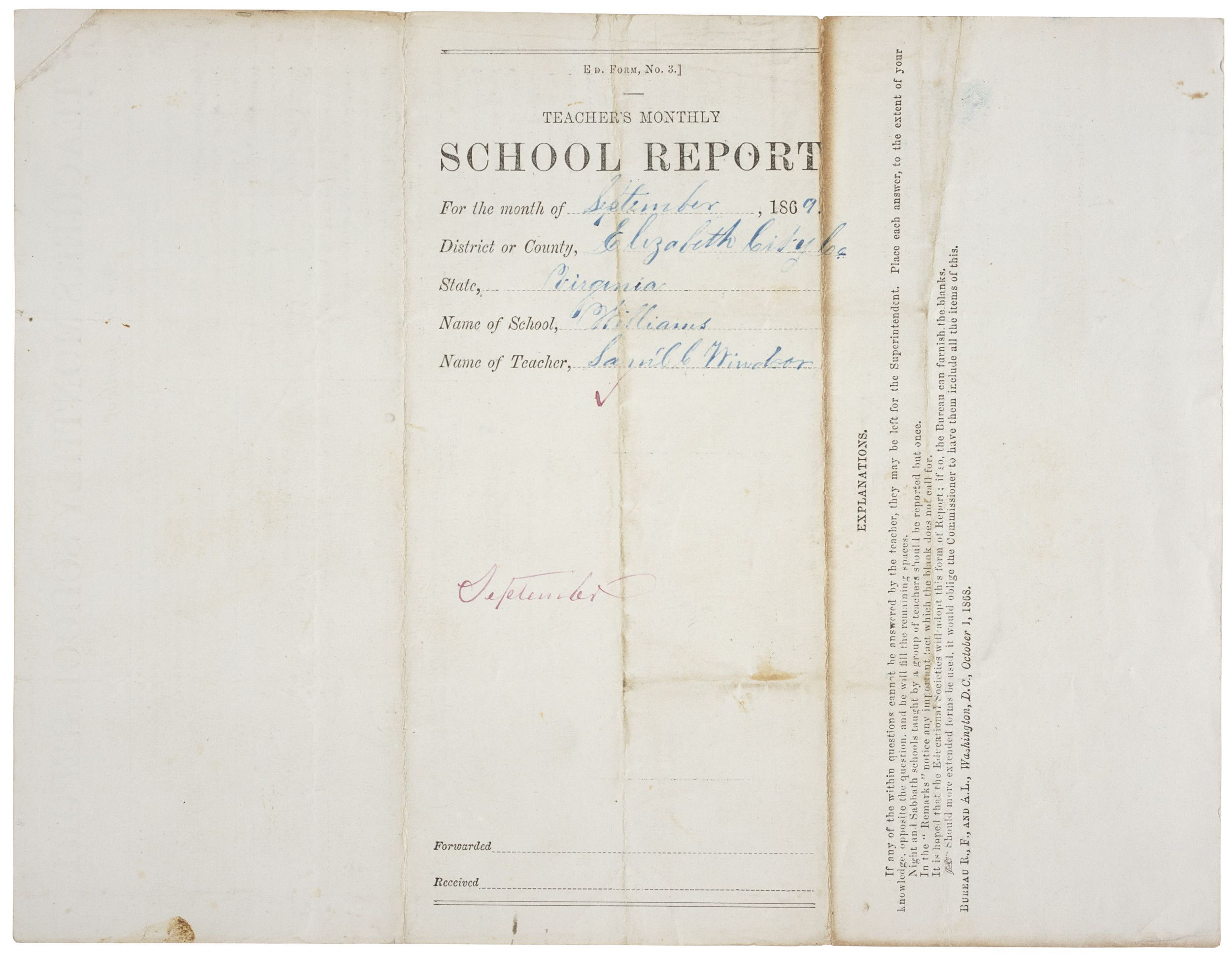
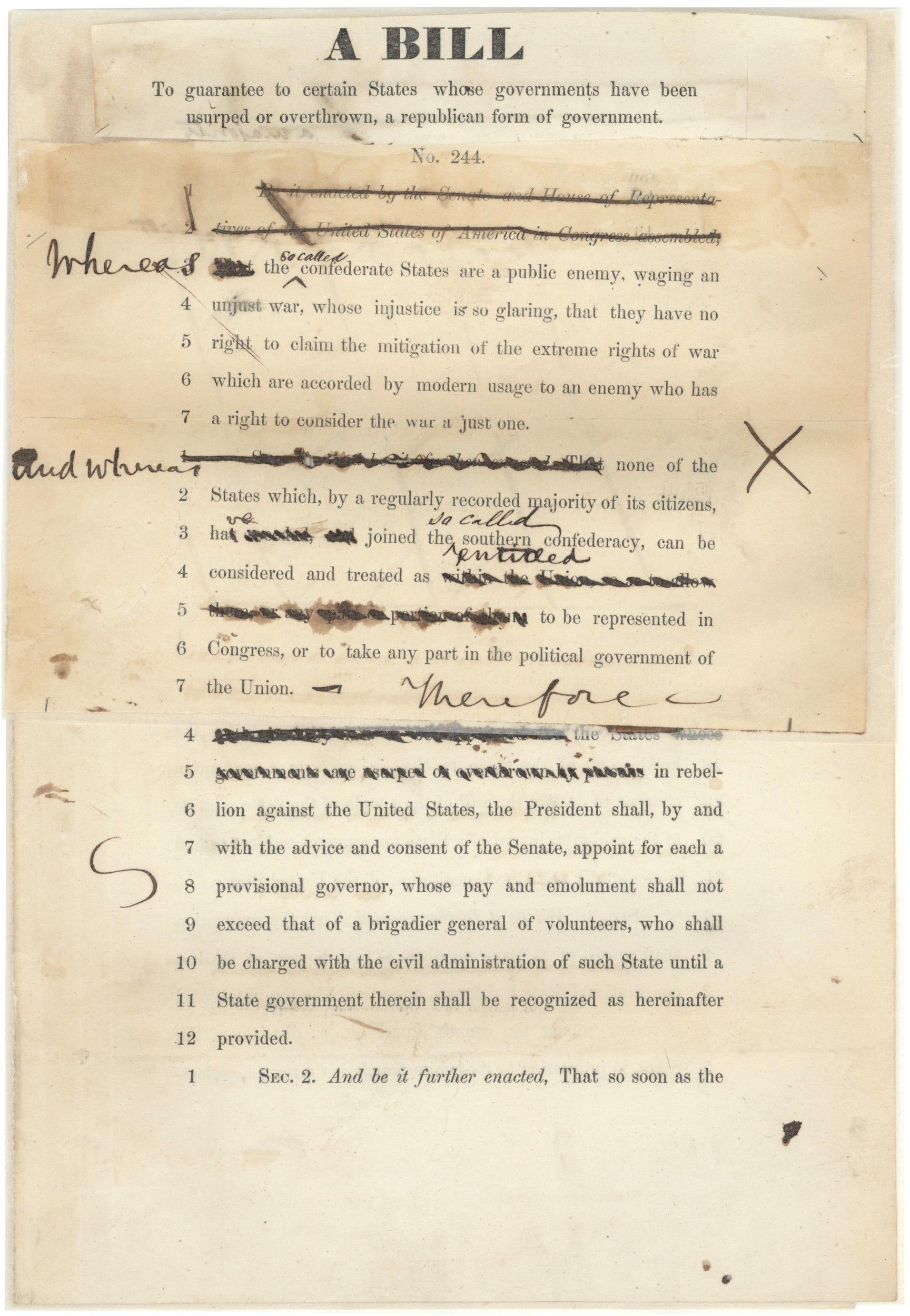
1
Activity Element
Page 1

2
Activity Element
Page 1

3
Activity Element
Page 1

4
Activity Element
Page 1

5
Activity Element
Page 1

Conclusion
Reconstruction and the Ku Klux Klan
Making Connections
Analyze each of the primary source documents, considering how peoples' lives changed after the Civil War. Discuss how these changes might have contributed to the formation and rise of hate groups such as the Ku Klux Klan during and following the Reconstruction Era.Your Response
Document
Register of Marriages
9/30/1865
While many enslaved couples formed lasting bonds during their enslavement, their marriages had no legal foundation or protection. The abolishment of slavery not only meant citizenship, but the ability to have legally recognized marriages without fear of the loss of a spouse through sale.
Congress established the Bureau of Refugees, Freedmen, and Abandoned Lands — better known as the Freedmen’s Bureau — as the Civil War neared its end, in 1865. The Bureau helped facilitate and record marriages.
The Freedmen's Bureau recorded the county marriages seen in this document, performed by D Maxwell, Clerk of the Court in North Carolina, for the quarter ending on September 30, 1865.
Congress established the Bureau of Refugees, Freedmen, and Abandoned Lands — better known as the Freedmen’s Bureau — as the Civil War neared its end, in 1865. The Bureau helped facilitate and record marriages.
The Freedmen's Bureau recorded the county marriages seen in this document, performed by D Maxwell, Clerk of the Court in North Carolina, for the quarter ending on September 30, 1865.
Transcript
Record of Marriages for Which licenses were issued by D Maxwell Clerk of County during the quarter ending September 30, 1865.[Entries include the following information in the following order:] Date – Names: Males – to – Females – Remarks [this column is entirely blank]
July 8 1865 – Albert Wheatly – to – Cressy [illegible]
[July] 5 [1865] – Elias Winthrop – [to] – Hannah Willson
[July] 21 [1865] – Joseph Gentile – [to] – Rebecca Sims
[July] 28 [1865] – Milas Owens – [to] – Sylva Brown
[July] 29 [1865] – Robert Johnson – [to] – Martha Blair
Aug 12 [1865] – John Sandford – [to] – Ellen Graham
[Aug] 17 [1865] – Monroe Harris – [to] – Miriam Simmons
[Aug] 17 [1865] – Thos Simmons – [to] – Charity Orr
[Aug] 26 [1865] – Thos Barnwell – [to] – Anny Houston
[Aug] 26 [1865] – Anozie Stile – [to] – Elina Stile
[Aug] 26 [1865] – Sandy Johnson – [to] – Roxana Pitts
[Aug] 31 [1865] – Doctor Sheppard – [to] – Indy McNealy
Sept 7 [1865] – John McCullough – [to] – Amanda Taylor
[Sept] 14 [1865] – Thos Orr – [to] – Louisa Orr
[Sept] 18 [1865] – Stephen Torrence – [to] – Dovy Maxwell
[Sept] 16 [1865] – James Sawson – [to] – Mary A Davis
[Sept] 18 [1865] – Amos Caldwell – [to] – Dinah Wilson
[Sept] 21 [1865] – Adolphus Young – [to] – Martha Lewis
[Sept] 25 [1865] – Edward Willson – [to] – Francis Johnson
[Sept] 27 [1865] – James Walker – [to] – Alicia Garth
The above is a correct Record transcribed from the Marriage Record in its Clerks office of this County.
[signed] John C Barnett
Capt & Asst Supt F.M.B.
Bu R F & A L
Charlotte NC
Oct 10th 1865
Barnett John C
Capt. & Supt.
Report of Marriages registered
During quarter preceding
September 30th 1865
This primary source comes from the Records of the Bureau of Refugees, Freedmen, and Abandoned Lands.
National Archives Identifier: 595052
Full Citation: Register of Marriages; 9/30/1865; Reports, 1865 - 1869; Records of the Bureau of Refugees, Freedmen, and Abandoned Lands, ; National Archives Building, Washington, DC. [Online Version, https://docsteach.org/documents/document/register-marriages, May 6, 2024]Register of Marriages
Page 1
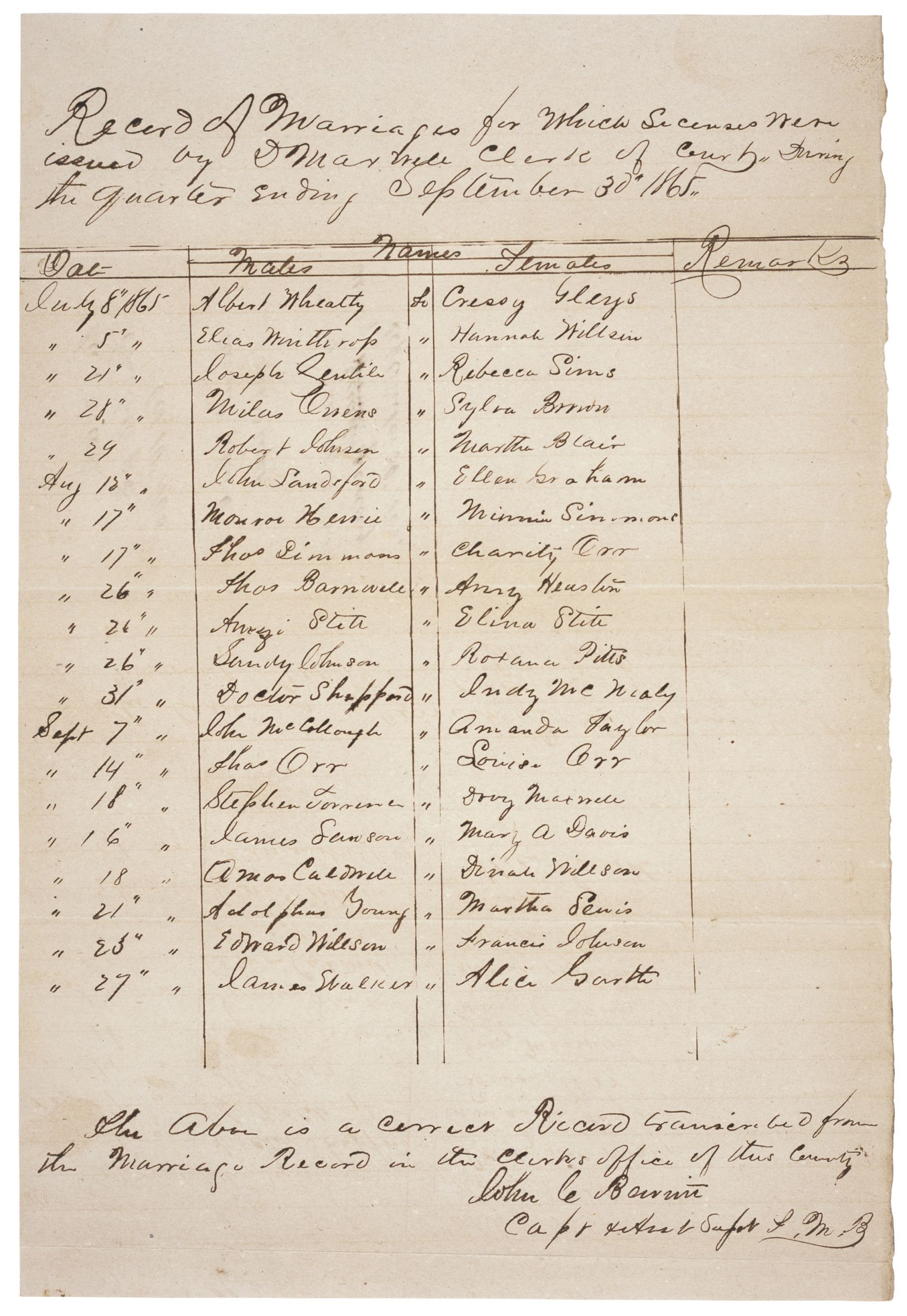
Register of Marriages
Page 2
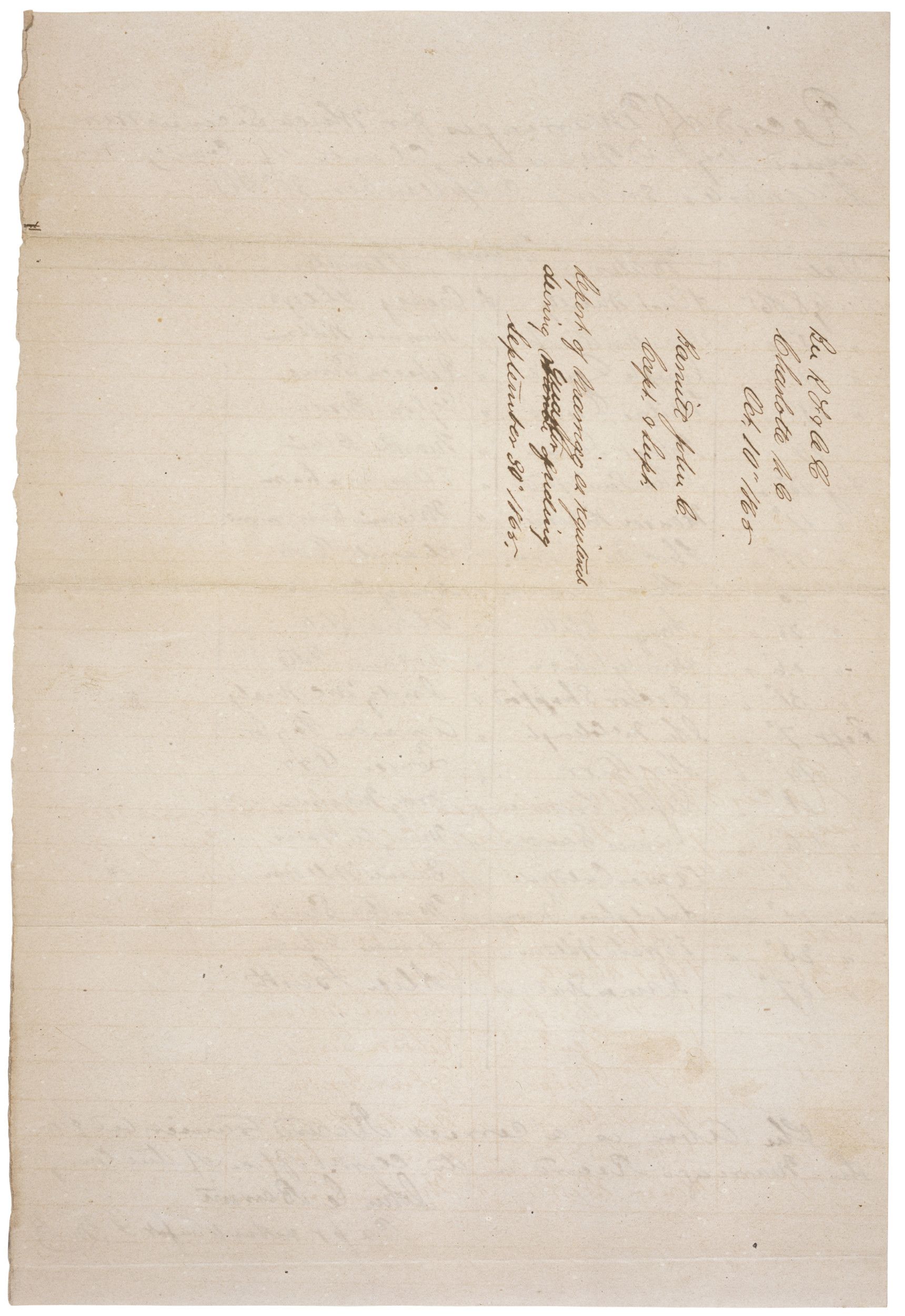
Document
Agreement of Labor for Truss B. Hall
8/28/1865
Following the Civil War, the Federal Government established the Bureau of Refugees, Freedmen, and Abandoned Lands to aid former slaves – better known as the Freedmen's Bureau.
One of the services this agency provided was assisting freedpeople with labor contracts. This contract acknowledged that Robert McKenzie, representing Robinson Company, would pay Truss B. Hall $4 a month for his service until December 25, and that Hall would "obey all lawful commands as he use to when a slave."
One of the services this agency provided was assisting freedpeople with labor contracts. This contract acknowledged that Robert McKenzie, representing Robinson Company, would pay Truss B. Hall $4 a month for his service until December 25, and that Hall would "obey all lawful commands as he use to when a slave."
Transcript
Office of Bureau of Refugees Freedmen &c.For Robeson Co
Lamberton Aug 28th 1865
This instrument witnesseth that Robert McKenzie of Robeson Co agrees to pay Truss B. Hall $4.00 per month until 25th day of December next for an in situation of the said Truss B. Hall rendering the Robert McKenzie true and faithful service and obey all lawful commands as he use to when a slave.
Robert McKenzie
Truss B. Hall
x his mark
Witnessed and approved
James Sinclair, agent of Bureau
This primary source comes from the Records of the Bureau of Refugees, Freedmen, and Abandoned Lands.
National Archives Identifier: 595055
Full Citation: Agreement of Labor for Truss B. Hall; 8/28/1865; Freedmen's Labor Contracts, 5/1865 - 12/1867; Records of the Bureau of Refugees, Freedmen, and Abandoned Lands, ; National Archives Building, Washington, DC. [Online Version, https://docsteach.org/documents/document/hall-labor-agreement, May 6, 2024]Agreement of Labor for Truss B. Hall
Page 1
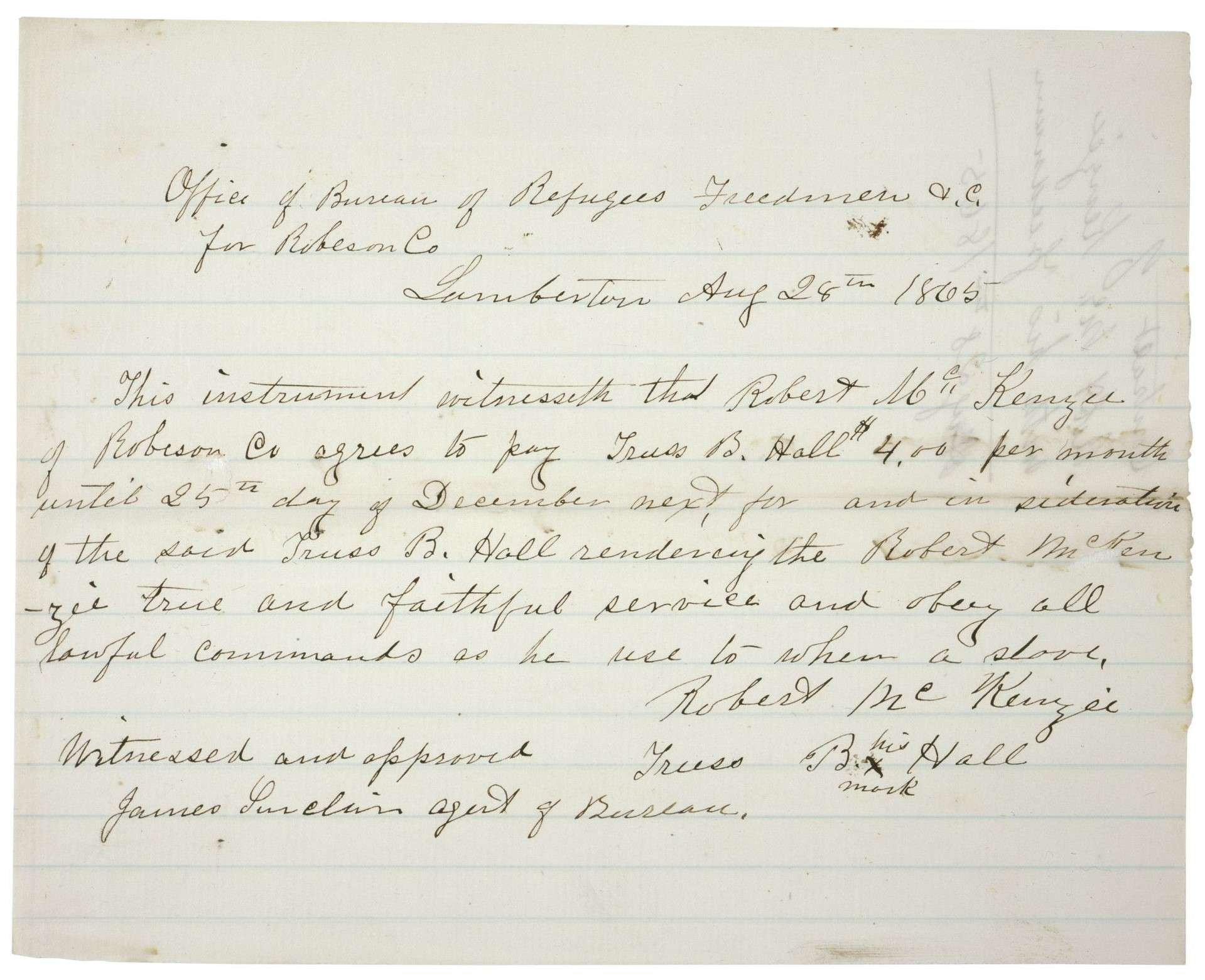
Document
Report of Plantation Leased by D. Keaton and Ora O. Kelsea
3/8/1865
This item is a report of a plantation leased by D. Keaton and Ora O. Kelsea in New Hanover and New Brunswick, North Carolina.
Additional details from our exhibits and publications
One of the major activities of the Freedmen's Bureau was the leasing of abandoned and confiscated property. Although their numbers were small, freedmen who had means were allowed to lease land ranging from 10 to 100 acres. This report records vital information about the owners of land held by the Freedmen's Bureau in New Hanover and Brunswick Counties, North Carolina.
This primary source comes from the Records of the Bureau of Refugees, Freedmen, and Abandoned Lands.
National Archives Identifier: 595060
Full Citation: Report of Plantation Leased by D. Keaton and Ora O. Kelsea; 3/8/1865; Records of the Bureau of Refugees, Freedmen, and Abandoned Lands, . [Online Version, https://docsteach.org/documents/document/report-of-plantation-leased-by-d-keaton-and-ora-o-kelsea, May 6, 2024]Report of Plantation Leased by D. Keaton and Ora O. Kelsea
Page 1
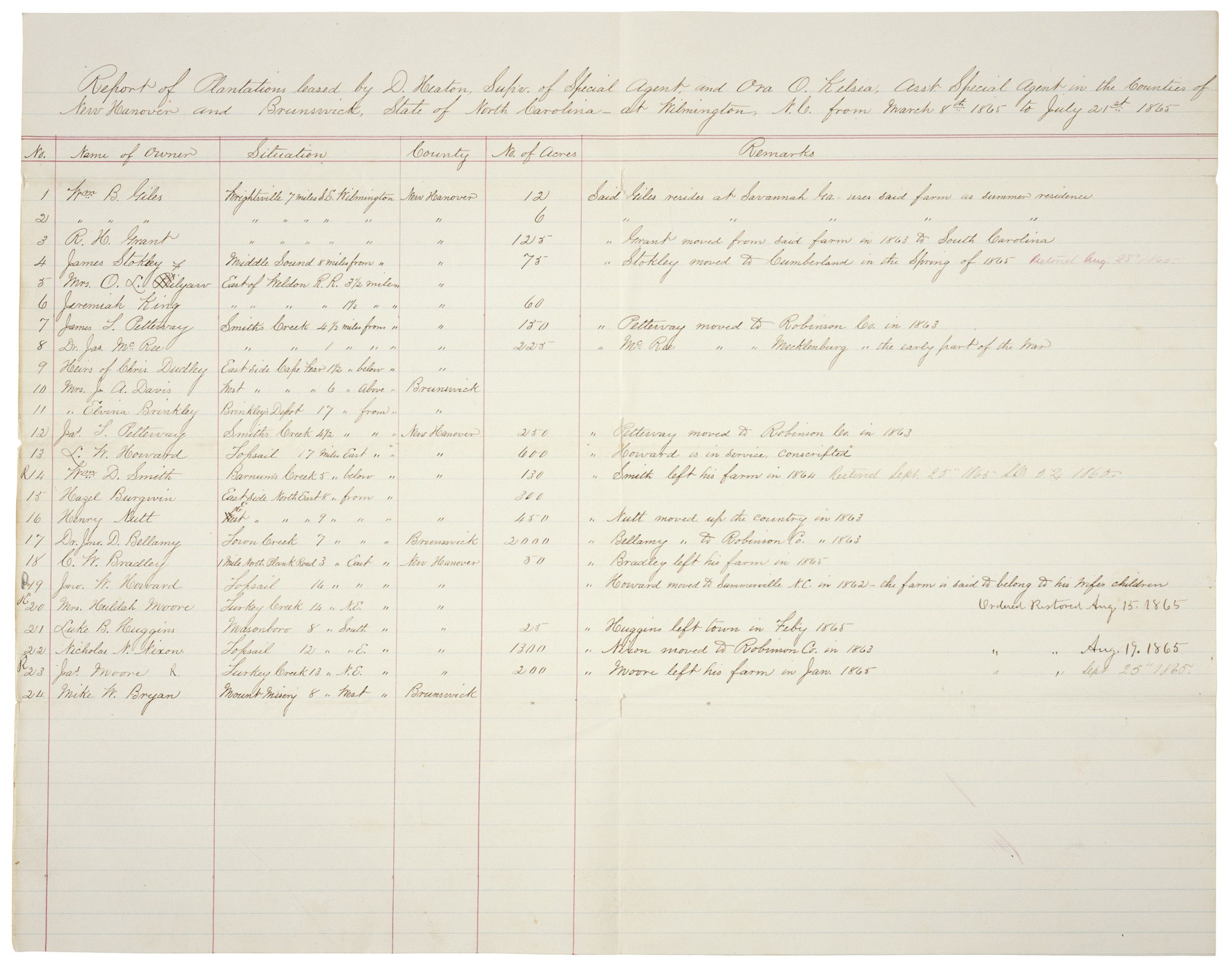
Report of Plantation Leased by D. Keaton and Ora O. Kelsea
Page 2

Report of Plantation Leased by D. Keaton and Ora O. Kelsea
Page 3

Document
Report for the Williams School in Virginia
9/1869
Following the Civil War and the ratification of the 13th Amendment, formerly enslaved persons faced many challenges. Congress established the Bureau of Refugees, Freedmen, and Abandoned Lands — better known as the Freedmen’s Bureau —within the War Department on March 3, 1865. The Bureau provided assistance to tens of thousands of formerly enslaved people. It helped freedpeople establish schools, purchase land, locate family members, and legalize marriages. The Bureau also supplied necessities such as food, clothing, and hospitals.
Teachers reported to the Freedmen’s Bureau monthly listing information such as the number of students enrolled in their school, sources of financial support, and what subjects students were studying. Despite their impoverished condition, African Americans contributed as best they could to support education in their communities. It is reported by this teacher that "the people are not able to pay the tuition, but they want to send their children to school."
Teachers reported to the Freedmen’s Bureau monthly listing information such as the number of students enrolled in their school, sources of financial support, and what subjects students were studying. Despite their impoverished condition, African Americans contributed as best they could to support education in their communities. It is reported by this teacher that "the people are not able to pay the tuition, but they want to send their children to school."
This primary source comes from the Records of the Bureau of Refugees, Freedmen, and Abandoned Lands.
National Archives Identifier: 595082
Full Citation: Report for the Williams School in Virginia; 9/1869; Teachers' Monthly School Reports, 3/1866 - 6/1871; Records of the Bureau of Refugees, Freedmen, and Abandoned Lands, ; National Archives Building, Washington, DC. [Online Version, https://docsteach.org/documents/document/report-williams-school, May 6, 2024]Report for the Williams School in Virginia
Page 1
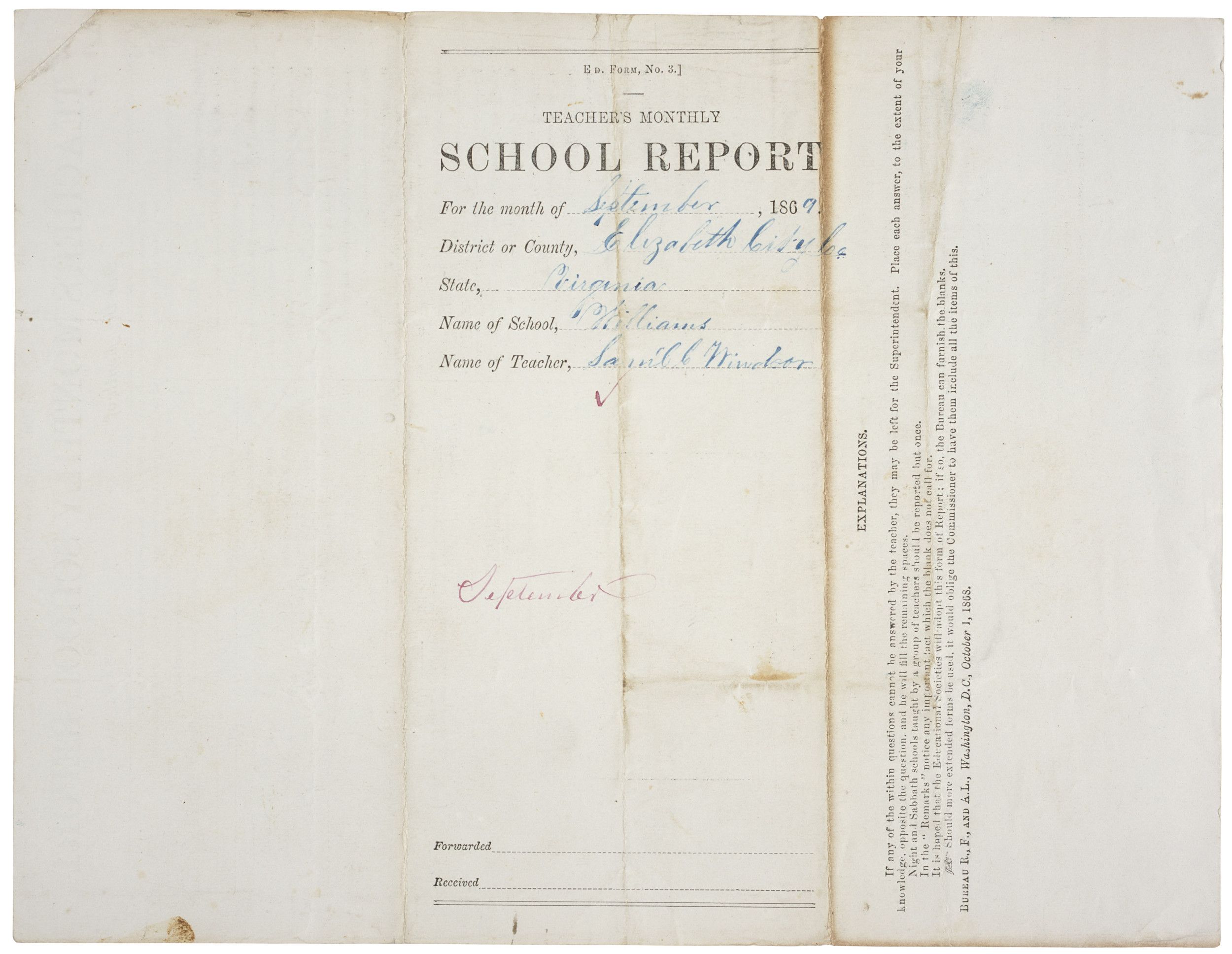
Report for the Williams School in Virginia
Page 2

Document
Wade-Davis Bill, as Amended
5/4/1864
In late 1863, President Abraham Lincoln and Congress began to consider the question of how the Union would be reunited if the North won the Civil War. In December, President Lincoln proposed a reconstruction program that would allow Confederate states to establish new state governments after 10 percent of their male population took loyalty oaths and the states recognized the permanent freedom of formerly enslaved people.
Several congressional Republicans thought Lincoln’s 10 percent plan was too lenient. Senator Benjamin F. Wade, of Ohio, and Representative Henry Winter Davis, of Maryland, proposed a more stringent plan in February 1864.
The Wade-Davis Reconstruction Bill would also have abolished slavery, but it required that 50 percent of a state's White males take a loyalty oath to the United States (and swear they had never assisted the Confederacy) to be readmitted to the Union. Only after taking this "Ironclad Oath" would they be able to participate in conventions to write new state constitutions.
Congress passed the Wade-Davis Bill, but President Lincoln chose not to sign it, killing the bill with a pocket veto. Lincoln continued to advocate tolerance and speed in plans for the reconstruction of the Union in opposition to Congress.
After Lincoln’s assassination in April 1865, however, Congress had the upper hand in shaping federal policy toward the defeated South and imposed the harsher reconstruction requirements first advocated in the Wade-Davis Bill. Some of the policies included in this bill were implemented in a series of four Reconstruction Acts (1867-1868), which were passed into law after Congress overrode the vetoes of President Andrew Johnson.
Several congressional Republicans thought Lincoln’s 10 percent plan was too lenient. Senator Benjamin F. Wade, of Ohio, and Representative Henry Winter Davis, of Maryland, proposed a more stringent plan in February 1864.
The Wade-Davis Reconstruction Bill would also have abolished slavery, but it required that 50 percent of a state's White males take a loyalty oath to the United States (and swear they had never assisted the Confederacy) to be readmitted to the Union. Only after taking this "Ironclad Oath" would they be able to participate in conventions to write new state constitutions.
Congress passed the Wade-Davis Bill, but President Lincoln chose not to sign it, killing the bill with a pocket veto. Lincoln continued to advocate tolerance and speed in plans for the reconstruction of the Union in opposition to Congress.
After Lincoln’s assassination in April 1865, however, Congress had the upper hand in shaping federal policy toward the defeated South and imposed the harsher reconstruction requirements first advocated in the Wade-Davis Bill. Some of the policies included in this bill were implemented in a series of four Reconstruction Acts (1867-1868), which were passed into law after Congress overrode the vetoes of President Andrew Johnson.
Transcript
A Bill to guarantee to certain States whose Governments have been usurped or overthrown a Republican Form of Government.Be it enacted by the Senate and House of Representatives of the United States of America in Congress assembled, That in the states declared in rebellion against the United States, the President shall, by and with the advice and con- sent of the Senate, appoint for each a provisiona1 governor, whose pay and emoluments shall not exceed that of a brigadier-general of volunteers, who shall be charged with the civil administration of such state until a state government therein shall be recognized as hereinafter provided.
SEC. 2. And be it further enacted, That so soon as the ...
This primary source comes from the Records of the U.S. House of Representatives.
National Archives Identifier: 5049648
Full Citation: Wade-Davis Bill, as Amended; 5/4/1864; Bills and Resolutions Originating in the House, 1789 - 1974; Records of the U.S. House of Representatives, ; National Archives Building, Washington, DC. [Online Version, https://docsteach.org/documents/document/wade-davis-bill, May 6, 2024]Wade-Davis Bill, as Amended
Page 1
